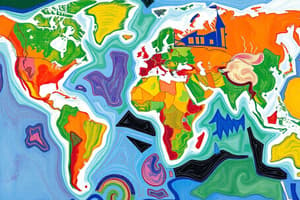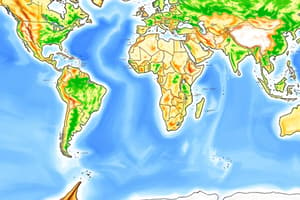Podcast
Questions and Answers
Which branch of geography specifically focuses on climate and ecosystems?
Which branch of geography specifically focuses on climate and ecosystems?
- Human Geography
- Physical Geography (correct)
- Geographical Techniques
- Cartography
What term describes the characteristics of a location that combine both physical and human elements?
What term describes the characteristics of a location that combine both physical and human elements?
- Regions
- Places (correct)
- Movements
- Locations
Which tool is primarily used for capturing, analyzing, and managing spatial data?
Which tool is primarily used for capturing, analyzing, and managing spatial data?
- Geographic Information Systems (correct)
- Thematic Maps
- Topographic Maps
- Remote Sensing
The process involving the flow of goods, ideas, and people across space is referred to as?
The process involving the flow of goods, ideas, and people across space is referred to as?
Which of the following is NOT considered a major theme in geography?
Which of the following is NOT considered a major theme in geography?
What is a key aspect of Human-Environment Interaction?
What is a key aspect of Human-Environment Interaction?
Which position involves utilizing geographic technology for urban planning and development?
Which position involves utilizing geographic technology for urban planning and development?
Which characteristic is associated with Formal Regions?
Which characteristic is associated with Formal Regions?
Flashcards are hidden until you start studying
Study Notes
Definition
- Geography is the study of the Earth’s landscapes, environments, and the relationships between people and their environments.
Branches of Geography
-
Physical Geography
- Focuses on natural features and processes.
- Includes landforms, climate, vegetation, and ecosystems.
-
Human Geography
- Examines human societies, cultures, and their interrelations with the environment.
- Includes urban geography, economic geography, and political geography.
-
Geographical Techniques
- Methods used to analyze geographic data.
- Includes Geographic Information Systems (GIS), remote sensing, and cartography.
Key Concepts
-
Location
- Absolute Location: Exact coordinates (latitude and longitude).
- Relative Location: Position relative to other places.
-
Place
- Describes the physical and human characteristics of a location.
- Includes cultural aspects, architecture, and demographics.
-
Region
- Areas defined by certain unifying characteristics (physical, cultural, or political).
- Types: Formal regions, functional regions, and vernacular regions.
-
Movement
- Refers to the flow of people, goods, and ideas across space.
- Influences cultural diffusion and globalization.
-
Human-Environment Interaction
- Examines how humans adapt to and modify their environment.
- Topics include sustainability, resource management, and environmental impact.
Important Tools
-
Maps
- Visual representations of geographic information.
- Types include topographic maps, thematic maps, and political maps.
-
GIS (Geographic Information Systems)
- Software for capturing, analyzing, and managing spatial data.
- Used in urban planning, environmental studies, and disaster management.
-
Remote Sensing
- The acquisition of information about an object or area from a distance, typically using satellites or aircraft.
Major Themes in Geography
-
Globalization
- The increasing interconnectedness of economies, cultures, and populations.
-
Urbanization
- The growth of urban areas and migration from rural to urban settings.
-
Sustainability
- Balancing human needs with the health of the planet for future generations.
Career Opportunities
- Urban planner
- Environmental consultant
- Geographic information systems technician
- Cartographer
- Climatologist
Current Trends
- Focus on climate change and its impacts.
- Increased use of technology in geographic research (e.g., big data, AI).
- Emphasis on sustainable development and environmental justice.
Definition
- Geography studies Earth's landscapes and environments, and the interactions between people and their surroundings.
Branches of Geography
- Physical Geography
- Investigates natural features like landforms, climate, vegetation, and ecosystems.
- Human Geography
- Analyzes human societies and cultures, including urban, economic, and political aspects.
- Geographical Techniques
- Employs methods like GIS, remote sensing, and cartography to analyze geographic data.
Key Concepts
- Location
- Absolute Location: specific coordinates (latitude and longitude).
- Relative Location: positioning in relation to other places.
- Place
- Defines physical and human characteristics, including culture, architecture, and demographics.
- Region
- Areas with unifying features; includes formal, functional, and vernacular regions.
- Movement
- Concerns the flow of people, goods, and ideas, influencing cultural diffusion and globalization.
- Human-Environment Interaction
- Examines how humans adapt to and modify their surroundings, covering sustainability and resource management.
Important Tools
- Maps
- Various types serve as visual geographic representations: topographic, thematic, and political maps.
- GIS (Geographic Information Systems)
- Software that captures, analyzes, and manages spatial data; instrumental in urban planning and environmental studies.
- Remote Sensing
- Acquires information about areas from a distance, often using satellites or aircraft.
Major Themes in Geography
- Globalization
- Highlights growing interconnectedness among economies, cultures, and populations.
- Urbanization
- Focuses on the expansion of urban areas and migration trends from rural to urban environments.
- Sustainability
- Promotes the balance between human needs and ecological health for future generations.
Career Opportunities
- Urban planner
- Environmental consultant
- GIS technician
- Cartographer
- Climatologist
Current Trends
- Increased emphasis on climate change impacts.
- Growing integration of technology in geographic research, including big data and AI.
- A stronger focus on sustainable development and environmental justice.
Studying That Suits You
Use AI to generate personalized quizzes and flashcards to suit your learning preferences.




